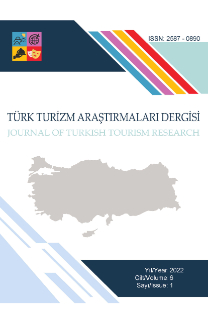Turist Rehberi Adaylarının 2019 Yılı Eğitim Uygulama Gezisine Yönelik Algıları: Nitel Bir Araştırma
Perceptions of Tourist Guide Candidates on 2019 Vocational Practice Trip: A Qualitative Research
___
- Avcikurt, C., Alper, B., and Geyik, S. (2009). Education and training of tourist guides in Turkey. Management and Education Academic Journal, 5(1), 57-63.
- Bas, T., and Akturan, U. (2008). Qualitative research methods. Ankara: Seçkin Publication.
- Black, R., and Weiler, B. (2005). Quality assurance and regulatory mechanisms in the tour guiding industry: a systematic review. Journal of Tourism Studies, 16(1), 24.
- Bowie, D., and Chang, J. C. (2005). Tourist satisfaction: A view from a mixed international guided package tour. Journal of Vacation Marketing, 11(4), 303-322.
- Cetin, G., and Yarcan, S. (2017). The professional relationship between tour guides and tour operators. Scandinavian Journal of Hospitality and Tourism, 17(4), 345-357.
- Coccossis, H. (2006). Operational management of cultural and heritage sites. In International Cultural Tourism (pp. 73-85). Routledge.
- Creswell, J. (2016). Research Design.: Qualitative, Quantitative, Mixed Methods Approaches. University of Nebraska-Lincoln.
- Creswell, John W. (2016). Araştırma Deseni: Nitel, Nicel ve Karma Yöntem Yaklaşımları, Eğitim Kitap, Ankara.
- Denzin, N. K., and Lincoln, Y. S. (Eds.). (2011). The Sage handbook of qualitative research. Sage Publications, Thousand Oaks, CA.
- Eker, N., ve Zengin, B. (2016). Turist rehberliği eğitiminin değerlendirilmesi: Profesyonel turist rehberleri üzerine bir uygulama. Eğitim ve Öğretim Araştırmaları Dergisi, 5(4), 65-74.
- Erdem, B., ve Etiz, N. (2012). Turist Rehberliği Bölümü Öğrencilerinin Rehberlik Tatbikat Gezisi Algıları: Balıkesir Üniversitesi TİOYO Örneği. Turizm Eğitimi Konferansı Tebliğler, 17-19.
- Funda, Ö. N., ve GÜLMEZ, M. (2018). Turist Rehberliği Yurtiçi Uygulama Gezilerinin Öğrenciler Açısından Değerlendirilmesi. Seyahat ve Otel İşletmeciliği Dergisi, 15(2), 320-335.
- Giorgi, A. (2009). The descriptive phenomenological method in psychology: A modified Husserlian approach. Duquesne University Press.
- http://tureb.org.tr/tr/Notices/Detail/872, [Erişim. Tarihi: 22.03.2019].
- http://tureb.org.tr/tr/Notices/Detail/893, [Erişim. Tarihi: 21.03.2019].
- Huang, S., and Weiler, B. (2010). A review and evaluation of China's quality assurance system for tour guiding. Journal of Sustainable Tourism, 18(7), 845-860.
- Huang, S., Hsu, C. H., and Chan, A. (2010). Tour guide performance and tourist satisfaction: A study of the package tours in Shanghai. Journal of Hospitality & Tourism Research, 34(1), 3-33.
- Jacobson, S. K., and Robles, R. (1992). Ecotourism, sustainable development, and conservation education: Development of a tour guide training program in Tortuguero, Costa Rica. Environmental Management, 16(6), 701-713.
- Kabii, F., Okello, M. M., and Kipruto, N. (2017). Effects of Tour Guides Training on Their Performance in Kenya. Journal of Tourism and Hospitality Management, 5(6), 233-250.
- Knudson, D. M., Cable, T. T., and Beck, L. (1995). Interpretation of cultural and natural resources. Venture Publishing, Inc., 1999 Cato Ave., State College, PA 16801.
- Kümbetoğlu, B. (2005). Sosyolojide ve Antropolojide Niteliksel Yöntem ve Araştırma, Bağlam Kitapevi, İstanbul
- Lovrentjev, S. (2015). Education of Tourist Guides: Case of Croatia. Procedia Economics and Finance, 23, 555- 562.
- Mason, P., and Christie, M. (2003). Tour guides as critically reflective practitioners: a proposed training model. Tourism Recreation Research, 28(1), 23-33.
- Moustakas, C. (1994). Phenomenological research methods. Sage Publications, Thousand Oaks, CA.
- Pond, K. L. (1993). The professional guide: Dynamics of tour guiding. Van Nostrand Reinhold Company. s. 95
- Rabotić, B. (2010, March). Tourist guides in contemporary tourism. In International conference on tourism and environment (pp. 353-364).
- Rabotić, B. (2015). Tourist guiding as a new course in higher education: The case of college of tourism in Belgrade. In 4th International Research Forum on Guided Tours Estoril, Portugal| 18th-21st March, 2015 (p. 114).
- Resmi Gazete (2014). Turist Rehberliği Meslek Yönetmeliği, http://tureb.org.tr/tr/Page/Detail/60 Erişim Tarihi: 16 Mart 2019
- Şimşek, G. (2012). Turizm Rehberliği Eğitiminde Teknoloji İvmesi: Etkileşimli Sanal Ortam. Turizm Eğitimi Konferansı–Tebliğler, 17-19.
- Turist Rehberliği Meslek Yönetmeliği, http://tureb.org.tr/tr/Page/Detail/60 Erişim Tarihi: 16 Mart 2019
- World Federation of Tourist Guide Association (WFTGA). Erişim Tarihi: 23.03.2019. http://www.wftga.org/tourist-guiding/what-tourist-guide
- Yenipınar, U., ve Zorkirişci, A. (2013). Türkiye ve Avrupa Birliği Ülkelerinde Turist Rehberliği Eğitimi. Cag University Journal of Social Sciences, 10(2).
- Yıldırım, A., ve Şimşek, H. (2005). Sosyal bilimlerde nitel araştırma yöntemleri. (5. Baskı). Ankara: Seçkin Yayıncılık.
- Yüksel, Atila ve Fisun Yüksel (2004). Turizmde Bilimsel Araştırma Yöntemleri, Turhan Kitabevi, Ankara.
- ISSN: 2587-0890
- Yayın Aralığı: Yılda 4 Sayı
- Başlangıç: 2017
- Yayıncı: Prof. Dr. Yüksel ÖZTÜRK
Arap Turistlerin Türklere Yönelik Önyargılarının Değerlendirilmesi: Doğu Karadeniz Bölgesi Örneği
GENCAY SAATCI, Özge GÜDÜ DEMİRBULAT
İstanbul’daki Kuş Sarayları: Son Şans
Rus Turistlerin Tekrar Ziyaret Etme Niyetlerinin Demografik Değişkenler Açısından İncelenmesi
Caner KÜÇÜKER, ÜLKER ÇOLAKOĞLU, GÜLSEREN YURCU
Kapadokya’da Balon Turizmi Deneyimi ve Kabul Edilebilir Risk Durumu
Bursa Uludağ Üniversitesi İznik Meslek Yüksekokulu Öğrencilerinin İznik ile İlgili Metaforları
Seyahat Acentalarında Turistik Ürünlerin Kişişelleştirilmesinin Bir Yolu Olarak Müşterilerle Üretim
Turizm Rehberliği Eğitimi Alan Öğrencilerin Yaşam Boyu Öğrenme Eğilimlerinin Belirlenmesi
AHMET KÖROĞLU, ÖZLEM KÖROĞLU, İpek ASMADİLİ
Turizm Endüstrisinde Robotlaşma
Sosyal Medyada Gelişmeleri Kaçırma Korkusunun Kişinin Tatil Satın Alma Niyetine Etkisi
FİLİZ ÖZLEM ÇETİNKAYA, RAMAZAN PARS ŞAHBAZ
AHMET ERDEM, KAMİL UNUR, FERHAT ŞEKER, Muhammet Abdulmecit KINIKLI
